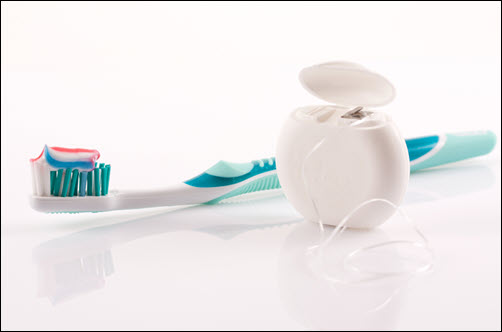Good Dental Habits for a Healthy Smile
Good dental habits protect teeth and gums from cavities, plaque, and gum disease. Brushing, flossing, and using mouthwash daily strengthen enamel and improve gum health. Consistent oral care reduces sensitivity and improves breath freshness. Poor dental hygiene increases the risk of tooth decay, gum recession, and bad breath. Developing good dental habits early creates a strong foundation for lifelong dental health. Stronger teeth improve chewing comfort and bite strength. Clean gums prevent inflammation and protect tooth stability. Creating a consistent oral care routine improves overall dental health and confidence. Let’s explore how to develop and maintain good dental habits for a healthier smile.
Brush Properly Twice a Day
 Brushing properly removes plaque and strengthens enamel. Use a soft-bristled toothbrush and fluoride toothpaste. Hold the toothbrush at a 45-degree angle to the gumline. Use small, circular motions to clean all tooth surfaces. Clean the front, back, and chewing surfaces of each tooth. Brush for at least two minutes, twice a day. Avoid scrubbing too hard to prevent gum damage and enamel wear. Clean the tongue and roof of the mouth to remove bacteria and improve breath freshness. Replace your toothbrush every three months or when bristles fray. Electric toothbrushes improve plaque removal and increase brushing efficiency. Proper brushing strengthens teeth and improves long-term dental health.
Brushing properly removes plaque and strengthens enamel. Use a soft-bristled toothbrush and fluoride toothpaste. Hold the toothbrush at a 45-degree angle to the gumline. Use small, circular motions to clean all tooth surfaces. Clean the front, back, and chewing surfaces of each tooth. Brush for at least two minutes, twice a day. Avoid scrubbing too hard to prevent gum damage and enamel wear. Clean the tongue and roof of the mouth to remove bacteria and improve breath freshness. Replace your toothbrush every three months or when bristles fray. Electric toothbrushes improve plaque removal and increase brushing efficiency. Proper brushing strengthens teeth and improves long-term dental health.
Floss Daily to Clean Between Teeth
Flossing removes plaque and food particles from between teeth and under the gumline. Use about 18 inches of floss, wrapping it around your middle fingers. Slide the floss between teeth using a back-and-forth motion. Curve the floss into a “C” shape around each tooth and clean under the gumline. Avoid snapping the floss, which damages gum tissue. Water flossers and floss picks provide alternative methods for hard-to-reach areas. Flossing once a day reduces plaque buildup and gum inflammation. Clean spaces between teeth improve overall gum health and dental comfort. Better flossing habits reduce cavity and gum disease risk. Stronger gums increase tooth stability and overall oral health.
Rinse with Antibacterial Mouthwash
Mouthwash reduces plaque, kills bacteria, and improves breath freshness. Use an antibacterial or fluoride mouthwash to strengthen enamel and protect against decay. Pour about 20 milliliters of mouthwash into a cup. Swish it around your mouth for 30 to 60 seconds. Gargle to clean the back of the throat and kill odor-causing bacteria. Spit out the mouthwash and avoid rinsing with water afterward. Alcohol-free mouthwash prevents dry mouth and reduces gum irritation. Fluoride-based mouthwash strengthens enamel and reduces sensitivity. Mouthwash improves plaque control and gum health. Rinsing after brushing and flossing improves overall dental strength and freshness. Better plaque control reduces cavity risk and improves breath quality.
Eat a Balanced Diet for Stronger Teeth
A balanced diet strengthens teeth and improves gum health. Calcium-rich foods like milk, cheese, and yogurt strengthen enamel. Leafy greens and crunchy vegetables stimulate saliva production and clean teeth naturally. Avoid sugary and acidic snacks that increase plaque and enamel erosion. Drinking water throughout the day improves saliva flow and protects enamel. Avoid sticky and chewy candies that trap bacteria and increase cavity risk. Vitamin D and phosphorus improve tooth strength and bone density. Better nutrition supports enamel strength and gum health. Stronger teeth increase bite comfort and reduce cavity risk. A balanced diet improves long-term oral health and strength.
Schedule Regular Dental Checkups
Professional dental checkups detect early signs of cavities, gum disease, and enamel erosion. Dentists recommend cleanings every six months to remove plaque and tartar. Regular exams allow early treatment of cavities and gum inflammation. Professional fluoride treatments strengthen enamel and reduce sensitivity. Dentists monitor tooth alignment and bite strength. Early detection of dental issues prevents complex treatments and tooth loss. Professional cleanings improve plaque removal and gum health. Regular dental visits reduce the need for fillings and root canals. Better professional care improves smile strength and bite comfort. Consistent checkups increase long-term dental health and confidence.
Protect Teeth from Grinding and Clenching
Teeth grinding (bruxism) weakens enamel and increases sensitivity. Stress, poor sleep, and misalignment increase grinding risk. Wearing a custom night guard reduces grinding pressure and protects enamel. Stress management techniques like deep breathing and meditation reduce jaw tension. Better sleep quality reduces muscle activity and grinding frequency. Reducing caffeine and alcohol intake lowers grinding risk. Professional dental adjustments improve bite alignment and reduce grinding pressure. Strengthened enamel resists grinding damage and reduces sensitivity. Protecting teeth from grinding improves bite comfort and tooth longevity. Reduced jaw strain increases overall dental health and comfort. Better protection supports stronger teeth and gums.
Avoid Harmful Habits and Maintain Good Hygiene
Avoid biting on hard objects like ice, pens, and fingernails to protect enamel. Smoking and tobacco use increase plaque buildup and gum inflammation. High-sugar diets increase cavity risk and enamel erosion. Drinking water after eating reduces food particle buildup and acid exposure. Brushing too hard damages enamel and increases gum recession. Using a soft-bristled toothbrush prevents gum damage and enamel wear. Avoid skipping brushing and flossing, even when tired. Better daily care increases tooth strength and gum health. Consistent oral care reduces plaque and improves overall dental comfort. Protecting teeth from damage increases long-term dental health and bite strength.
Encourage Good Habits in Children
 Teaching children proper brushing and flossing early improves lifelong oral health. Use a small, soft-bristled toothbrush for young children. Encourage brushing for two minutes with fluoride toothpaste. Flossing helps children develop better plaque control and gum health. Reward consistent brushing and flossing to build positive habits. Teach proper tongue cleaning and breath control. Monitor sugar intake and encourage water consumption. Schedule regular pediatric dental checkups to monitor tooth development. Early cavity prevention improves future tooth strength and alignment. Better childhood dental habits increase long-term oral health and confidence. Stronger teeth improve chewing comfort and smile appearance.
Teaching children proper brushing and flossing early improves lifelong oral health. Use a small, soft-bristled toothbrush for young children. Encourage brushing for two minutes with fluoride toothpaste. Flossing helps children develop better plaque control and gum health. Reward consistent brushing and flossing to build positive habits. Teach proper tongue cleaning and breath control. Monitor sugar intake and encourage water consumption. Schedule regular pediatric dental checkups to monitor tooth development. Early cavity prevention improves future tooth strength and alignment. Better childhood dental habits increase long-term oral health and confidence. Stronger teeth improve chewing comfort and smile appearance.
Developing good dental habits protects teeth and gums from plaque, cavities, and gum disease. Brushing, flossing, and using mouthwash daily strengthen enamel and improve gum health. Eating a balanced diet improves tooth strength and reduces plaque buildup. Regular dental checkups detect and treat early dental problems. Protecting teeth from grinding and harmful habits increases enamel strength. Encouraging good habits in children improves long-term dental health and confidence. Consistent care reduces the need for complex dental treatments. Investing in good dental habits strengthens teeth and improves overall comfort. Healthy teeth and gums create a balanced and confident smile.



